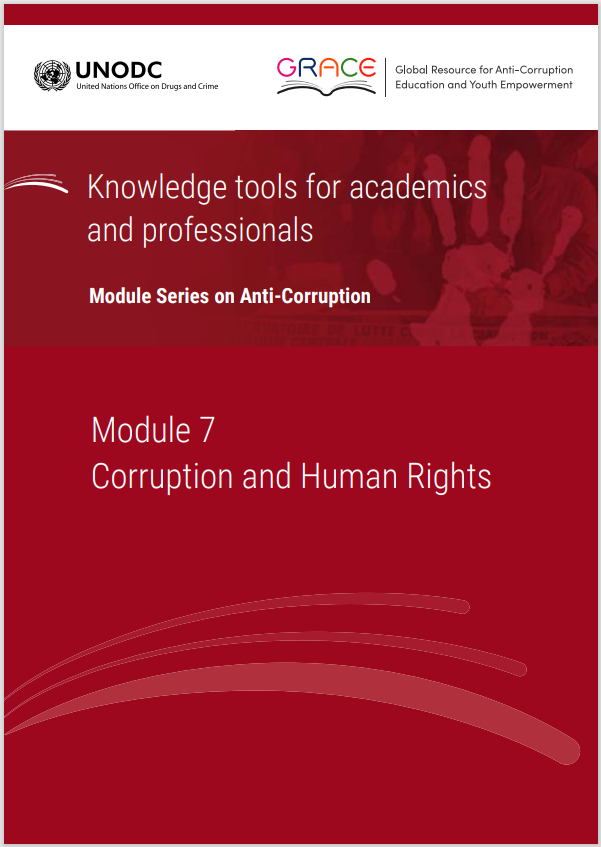
This module is a resource for lecturers
Guidelines to develop a stand-alone course
This Module provides an outline for a three-hour class, but there is potential to develop its topics further into a stand-alone course. The scope and structure of such a course will be determined by the specific needs of each context, but a possible structure is presented here as a suggestion.
|
Session
|
Topic
|
Brief Description
|
|
1
|
What is corruption, and why should we care?
|
- Students learn what corruption is, the different crimes that fall under it, and the difference between petty, grand, and systemic corruption. They learn what causes corruption, from an economic and social perspective. These introductory points can be based on Module 1.
|
|
2
|
The human rights-based approach
|
- To understand the complex relationship between corruption and human rights, students learn more about the human rights-based approaches, and their historical development and main characteristics. Students also partake in critical reflection.
|
|
3
|
Description of different approaches to the corruption–human rights link and critical reflection I
|
- Students learn about the three levels of state obligations (respect, protect and fulfil) and the “causal link approach” of the International Council of Human Rights.
|
|
4
|
Description of different approaches to the corruption– human rights link and critical reflection II
|
- Students learn about Boersma’s “dimensions” approach and the classification used by the Human Rights Council Advisory Committee.
|
|
5
|
How are human rights violations and corruption related?
|
- Students contemplate a summary and comparison of the approaches; and identify similarities and differences, as well as benefits and limitations.
|
|
6
|
Which and how can human rights can be violated by corruption?
|
- Civil and political rights, as well as economic, social and cultural rights, are described and the link to corruption is explained.
|
|
7
|
Corruption as a violation of civil and political rights
|
- Corruption is discussed as a violation of civil and political rights, in particular the rights to equality and non-discrimination; the rights to a fair trial and to an effective remedy; and the rights of political participation. Students find and discuss specific examples based on case studies.
|
|
8
|
Corruption in the judiciary
|
- This class provides an overview of corruption in the justice system. Students discuss the role of corruption in the judiciary, with a special focus on the right to a fair trial. Students review cases of justice system corruption and discuss the effects of corruption. (Relevant resources and training material are available on the website of UNODC’s Global Judicial Integrity Network).
|
|
9
|
Corruption as a violation of economic, social and cultural rights
|
- Corruption is discussed as a violation of economic, social and cultural rights, in particular the right to an adequate standard of living (rights to food, housing, health and education). Students find and discuss specific examples based on case studies.
|
|
10
|
Case study: Corruption and the violation of the right to education
|
- This class discusses the connection between corruption and human rights by examining a case study that directly impacts students – that of the violation of the right to education. Students together look for specific cases, describe and analyse the situation, and discuss potential solutions to protect the right to education.
|
|
11
|
Is corruption itself a human rights violation?
|
- The class summarizes the examples of human rights violations under discussion and provides arguments why corruption should, or should not, be considered a human rights violation. The associated implications are considered.
|
|
12
|
The benefits of combining the human rights and anti-corruption agenda
|
- The class describes and discusses the added value of integrating human rights’ principles into anti-corruption strategies and/or policies.
|
|
13
|
Conclusion
|
- Students review course concepts, identify current challenges and suggest strategies for improvement. Emphasis is placed on the fundamental nature of human rights and the degree to which their violation by corruption damages individuals and society.
|
 Back to top
Back to top